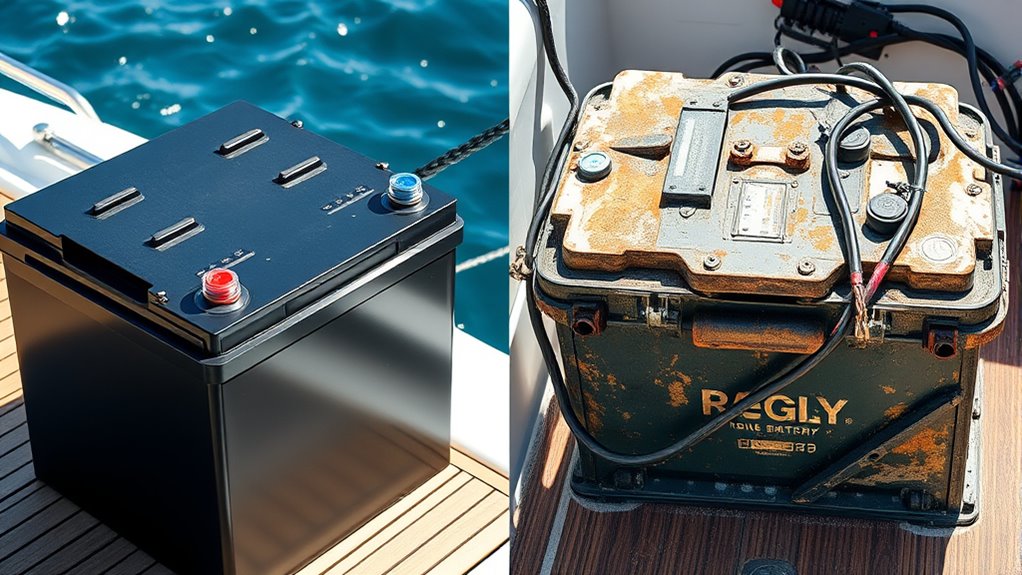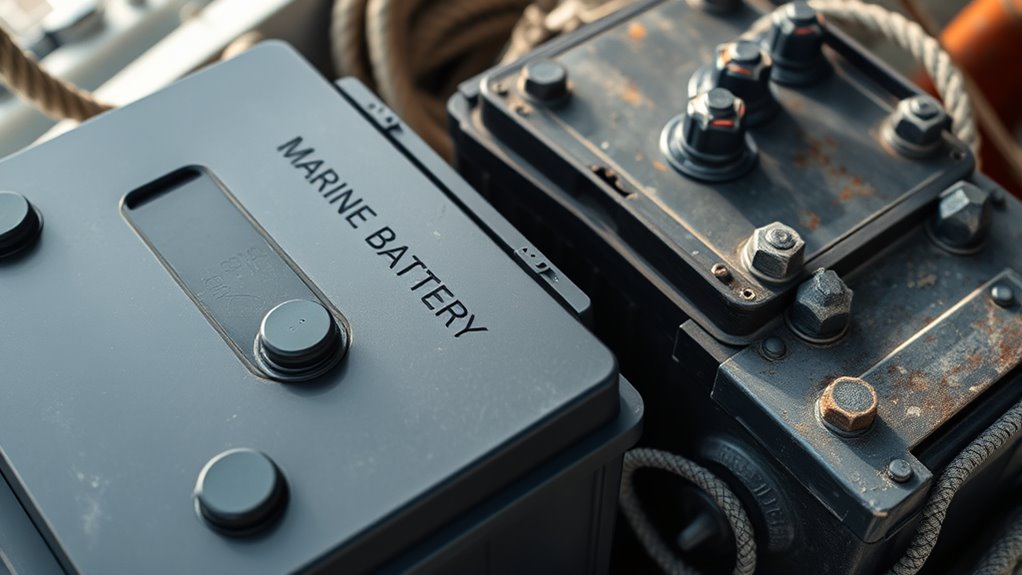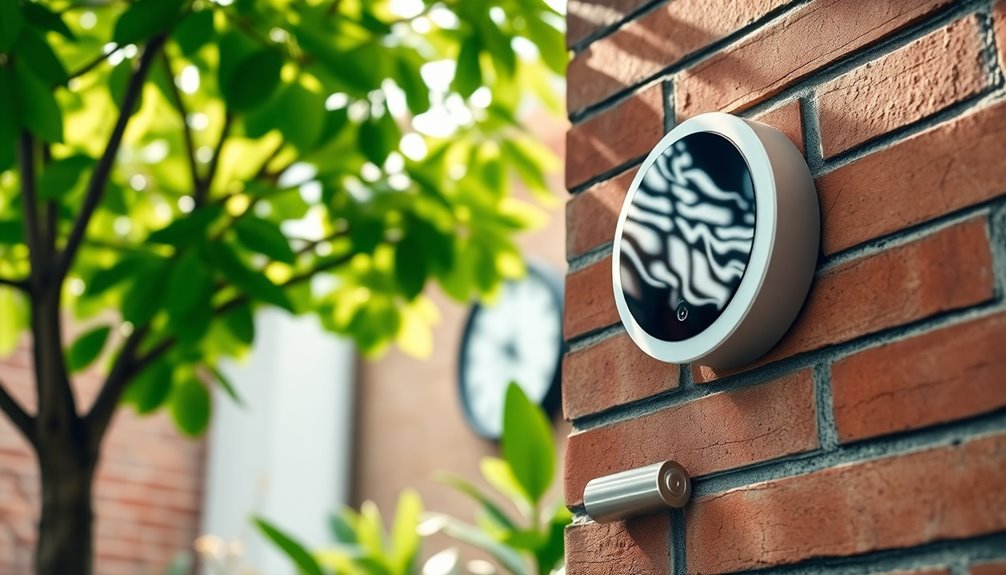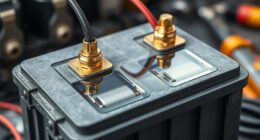If you’re choosing between AGM and flooded lead-acid batteries for your boat, consider how much maintenance you’re willing to do and your safety priorities. AGM batteries are sealed, low-maintenance, more resistant to shocks, and safer, but they cost more upfront. Flooded batteries are cheaper but require regular checks and handling with care. To find the best fit for your boat’s needs and learn how each type performs long-term, explore the details ahead.
Key Takeaways
- AGM batteries are low-maintenance, sealed, and spill-proof, making them safer and easier to handle on boats.
- Flooded lead-acid batteries are more affordable upfront but require regular maintenance and careful handling.
- AGM batteries are more resistant to vibrations and shocks, ideal for rough or active boat environments.
- Flooded batteries need frequent fluid checks and terminal cleaning, which can be labor-intensive.
- Consider your budget, maintenance willingness, and safety needs when choosing between AGM and flooded lead-acid batteries.

AGM batteries, or Absorbed Glass Mat batteries, are known for being low-maintenance. Unlike flooded lead-acid batteries, they don’t require regular checking of fluid levels because the electrolyte is sealed within glass mats. This means you don’t have to worry about adding distilled water or dealing with acid spills. If you prefer a hassle-free setup, AGM batteries are a solid choice. They also tend to be more resistant to vibrations and shocks, which makes them more durable in boat environments. Plus, AGM batteries are generally safer because the sealed design reduces the risk of acid leaks, which could cause corrosion or damage to your boat’s interior. They also have a lower self-discharge rate, so they retain charge longer when not in use, making them ideal for boats that sit idle for extended periods. Additionally, research into battery technology advancements shows ongoing improvements in performance and safety features for AGM batteries.
Flooded lead-acid batteries, on the other hand, are the traditional choice and often more affordable upfront. However, they require more diligent battery maintenance, including regular checks of water levels and cleaning of terminals to prevent corrosion. Handling flooded batteries involves more safety considerations because the sulfuric acid inside can be hazardous if spilled or mishandled. You need to wear protective gear when handling them and ensure proper ventilation in the battery area to avoid dangerous fumes. Safety considerations are especially important on boats where space can be tight, and spills could pose a significant risk. While flooded batteries can deliver high starting power, they demand more attention and care to operate safely and effectively.
Frequently Asked Questions
How Long Do AGM and Flooded Lead-Acid Batteries Typically Last?
Your battery lifespan depends on how well you maintain it and its type. AGM batteries typically last 3 to 5 years with minimal maintenance, thanks to their sealed design, reducing maintenance frequency. Flooded lead-acid batteries usually last 4 to 6 years but require regular water level checks and cleaning. Proper maintenance extends both batteries’ lifespan, so staying consistent with upkeep is key to maximizing their performance and longevity.
Are AGM Batteries More Environmentally Friendly Than Flooded Lead-Acid?
You might wonder if AGM batteries are more eco-friendly than flooded lead-acid ones. Generally, AGM batteries produce fewer manufacturing emissions and are easier to recycle due to better recycling programs. They also last longer, reducing waste over time. While both types have environmental impacts, AGM batteries tend to be the greener choice because of their cleaner manufacturing process and improved recyclability, helping you minimize your boat’s environmental footprint.
Can AGM Batteries Be Used in All Boat Types?
You’re asking if AGM batteries can be used in all boat types—well, don’t put all your eggs in one basket. AGM batteries are versatile and work well with many marine electronics, providing reliable power without spilling acid. Plus, they’re easier to recycle, making them a smart choice for various boats. However, always check your boat’s specific requirements to guarantee compatibility and peak performance.
What Maintenance Is Required for Flooded Lead-Acid Batteries?
You need to regularly check your flooded lead-acid batteries’ electrolyte levels and top them off with distilled water when needed. Keep the terminals clean and free from corrosion, and perform battery reconditioning periodically to extend lifespan. Make sure to store batteries in a cool, dry place and inspect for any leaks or damage. Proper maintenance ensures peak performance and prevents unexpected failures during your boating adventures.
Are There Specific Charging Requirements for AGM Versus Flooded Lead-Acid Batteries?
You need to know that AGM and flooded lead-acid batteries have different charging requirements. AGM batteries typically require a higher voltage for ideal charging, and you should avoid overcharging to prolong their lifespan. Flooded lead-acid batteries need a slower, more controlled charging cycle to prevent damage. Both types’ battery capacity influences charging cycles, so always follow the manufacturer’s recommendations to guarantee proper charge and maximize life.
Conclusion
Choosing between AGM and flooded lead-acid batteries is like picking the perfect anchor for your boat’s journey. AGM batteries are your steady compass—reliable, maintenance-free, and ready to weather any storm. Flooded lead-acid batteries are more like a trusty sail—cost-effective but requiring attention. Whichever you pick, guarantee it fits your voyage’s needs. With the right battery, your boat will glide smoothly across the water, your adventures sailing on a sea of confidence.










